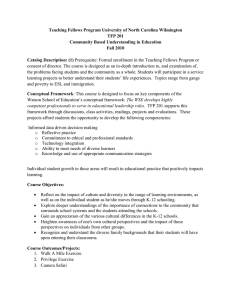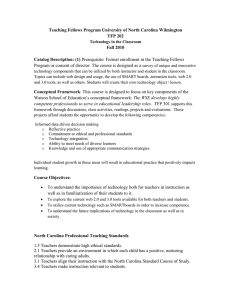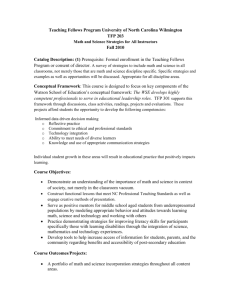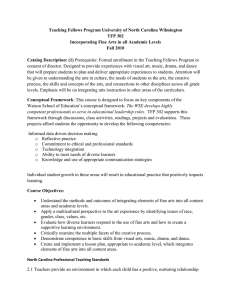Teaching Fellows Program University of North Carolina Wilmington TFP 205
advertisement
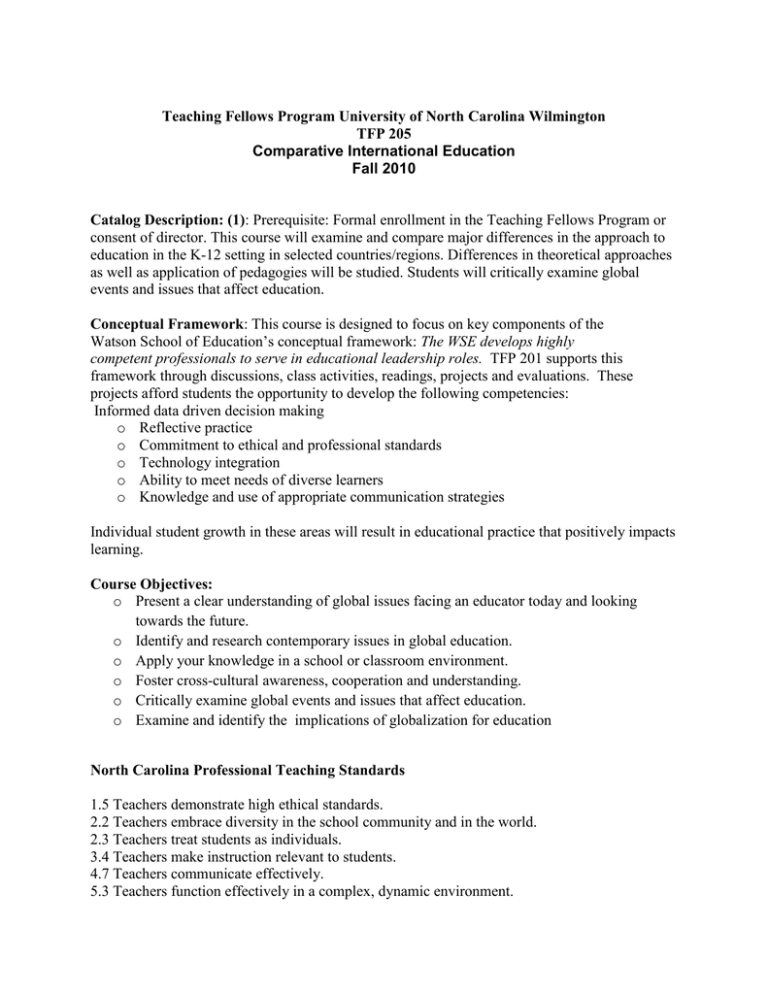
Teaching Fellows Program University of North Carolina Wilmington TFP 205 Comparative International Education Fall 2010 Catalog Description: (1): Prerequisite: Formal enrollment in the Teaching Fellows Program or consent of director. This course will examine and compare major differences in the approach to education in the K-12 setting in selected countries/regions. Differences in theoretical approaches as well as application of pedagogies will be studied. Students will critically examine global events and issues that affect education. Conceptual Framework: This course is designed to focus on key components of the Watson School of Education’s conceptual framework: The WSE develops highly competent professionals to serve in educational leadership roles. TFP 201 supports this framework through discussions, class activities, readings, projects and evaluations. These projects afford students the opportunity to develop the following competencies: Informed data driven decision making o Reflective practice o Commitment to ethical and professional standards o Technology integration o Ability to meet needs of diverse learners o Knowledge and use of appropriate communication strategies Individual student growth in these areas will result in educational practice that positively impacts learning. Course Objectives: o Present a clear understanding of global issues facing an educator today and looking towards the future. o Identify and research contemporary issues in global education. o Apply your knowledge in a school or classroom environment. o Foster cross-cultural awareness, cooperation and understanding. o Critically examine global events and issues that affect education. o Examine and identify the implications of globalization for education North Carolina Professional Teaching Standards 1.5 Teachers demonstrate high ethical standards. 2.2 Teachers embrace diversity in the school community and in the world. 2.3 Teachers treat students as individuals. 3.4 Teachers make instruction relevant to students. 4.7 Teachers communicate effectively. 5.3 Teachers function effectively in a complex, dynamic environment. Course Outcomes/Projects: o Assess various countries government, educational system, and role in international policies. o Conduct interactions with teens and college students in researched countries through Skype. o Actively participate in presentations by various international professors. Class Attendance Tardiness, requests to leave early, and/or absences will result in your grade being lowered a half letter grade. (ONE absence is permitted but not recommended.) None of these reasons excuse you from fulfilling all course requirements. Please make an appointment with me within the first three (3) weeks of class if you have scholarship responsibilities that require you to miss classes due to UNCW-sponsored events or performances. Grade Distribution – Grades earned are awarded using the University letter system. A 90-100 C 70-79 F 59 & Below B 80-89 D 60-69 UNCW Honor Code Statement All students enrolled at UNCW are subject to the UNCW Student Academic Honor Code (hereafter referred to as the Honor Code), which is intended to help every member of the UNCW community appreciate the high value placed on academic integrity and the means that will be employed to ensure its preservation. Students are expected to perpetuate a campus culture where each student does his or her own work while relying on appropriate resources for assistance. In such a climate students enjoy a special trust that they are members of a unique community where one’s thoughts and words are attributed correctly and with proper ownership, and where there is little need for systems to sanction those who cheat. As such, all UNCW students shall commit to the principles and spirit of the Honor Code by adhering to the following pledge: “As a student at The University of North Carolina Wilmington, I am committed to honesty and truthfulness in academic inquiry and in the pursuit of knowledge. I pledge to uphold and promote the UNCW Student Academic Honor Code.”
